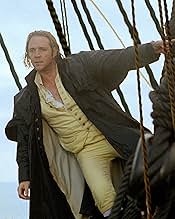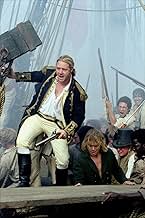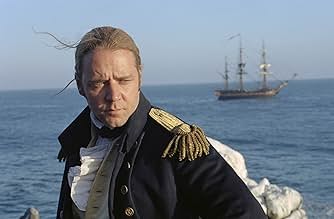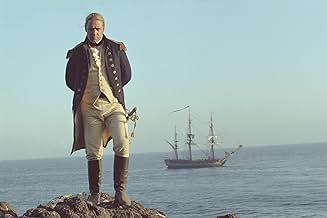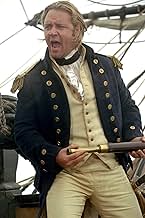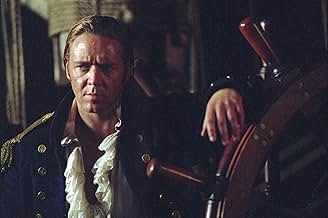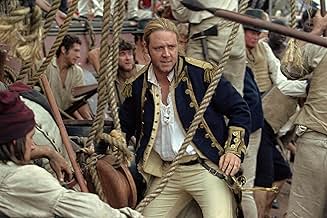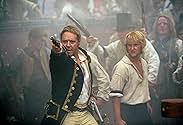Master and Commander : De l'autre côté du monde
Original title: Master and Commander: The Far Side of the World
During the Napoleonic Wars, a brash British captain pushes his ship and crew to their limits in pursuit of a formidable French war vessel around South America.During the Napoleonic Wars, a brash British captain pushes his ship and crew to their limits in pursuit of a formidable French war vessel around South America.During the Napoleonic Wars, a brash British captain pushes his ship and crew to their limits in pursuit of a formidable French war vessel around South America.
- Director
- Writers
- Stars
- Won 2 Oscars
- 23 wins & 90 nominations total
- Director
- Writers
- All cast & crew
- Production, box office & more at IMDbPro
Featured reviews
Few films manage to capture the era in which the original work was set and often rely on clichés of the particular genre at the expense of the core story. This film manages to avoid these pitfalls but more importantly serves as a worthwhile historical document. Anyone who is new to this period of history will not go far wrong keeping a copy of this movie as the attention to detail is excellent and adds to the experience as a whole (teachers take note).
This movie manages to tread a fine line between gritty realism and Boy's Own, portraying the pursuit of an elite French warship by an older embattled British frigate. The production values are very high and the dialogue and length allow the director a better than average framework for character development. The predominantly unknown British supporting cast (some aged as young as 12) are expertly handled and provide a counter balance to the excellent performances of Crowe and Bettany. Crowe's delivery is very reminiscent of Richard Burton, exuding a measured screen presence without overpowering the dialogue.
It would have been easy for the director to read through the salty notes of previous period pieces and deliver the usual tale of ocean going brutality and scurvy encrusted woe but Peter Weir's version of order through respect and camaraderie is far more believable especially when you realize that the sailor's greatest enemy was the ocean itself.
I found little to dislike and much to admire. Highly recommended.
This movie manages to tread a fine line between gritty realism and Boy's Own, portraying the pursuit of an elite French warship by an older embattled British frigate. The production values are very high and the dialogue and length allow the director a better than average framework for character development. The predominantly unknown British supporting cast (some aged as young as 12) are expertly handled and provide a counter balance to the excellent performances of Crowe and Bettany. Crowe's delivery is very reminiscent of Richard Burton, exuding a measured screen presence without overpowering the dialogue.
It would have been easy for the director to read through the salty notes of previous period pieces and deliver the usual tale of ocean going brutality and scurvy encrusted woe but Peter Weir's version of order through respect and camaraderie is far more believable especially when you realize that the sailor's greatest enemy was the ocean itself.
I found little to dislike and much to admire. Highly recommended.
See this film NOW at the best, state of the art theater you can find. You'll know why five minutes in.
I didn't want to leave the theater when this roller coaster rhapsody to sea soldiery circa 1805 was over. It's stirring entertainment. No love interests needed. This was what it was really like. One ship, 197 men, 4500 miles from home. Chasing a French ship twice her size. No retreat.
Pirates of the Crappy Be-in was a cute romp, but Master and Commander has real ships, real crews, real cannon,convincing characters, historical accuracy and a REAL film director.
Director/ Peter Weir (Witness) has returned big time and, with this one film, revived classic Australian realism, actually surpassing the production values of Peter Jackson's Ring Trilogy. This is not a fantasy film, but history - painstakingly recreated. And rousing history it is, with plenty of action AND robust character development. The adaptation by Weir and John Colley is right on target, brimming with great characters and scenes.
And Russel Crowe? Other than "The Insider", this is his best role ever. Gladiator was just a warm-up. A Beautiful Mind? Well, nice acting from the neck up. Go see this if you want to see both his athleticism and his formidable acting chops! And he decent musical gifts as well (RC studied violin for the role).
I've always thought Weir was one of our great directors. Now he's been given all the toys Peter Jackson enjoys. And Weir uses them to great effect - recreating a nautical reality that lacks nothing except the need to wipe your face every ten seconds. The cutting of Russel Boyd's fabulous photography is perfect. You get to know every inch of the ship, topside and down below. You also get a strong sense of the social dynamics on board - how men got along with each other for so many months. I felt swept along in a perfect mix of virile action and characters I could get to know and care for. One thing I loved was the constant caring between many of the men along the rank and file. There's a strong sense of honor and decency in the film. Yet enough grog flows to keep things loose.
This is vigorous stuff and my most thrilling two hours in a theater for a while. Congratulations to everyone involved.
For now, the best director Oscar goes to Peter Weir over Clint Eastwood (Mystic River)in 2004. Master and Commander is my pick for best picture, just because it is so masterfully realized. A stunning, exhilarating, and - at last - realistic action saga.
I didn't want to leave the theater when this roller coaster rhapsody to sea soldiery circa 1805 was over. It's stirring entertainment. No love interests needed. This was what it was really like. One ship, 197 men, 4500 miles from home. Chasing a French ship twice her size. No retreat.
Pirates of the Crappy Be-in was a cute romp, but Master and Commander has real ships, real crews, real cannon,convincing characters, historical accuracy and a REAL film director.
Director/ Peter Weir (Witness) has returned big time and, with this one film, revived classic Australian realism, actually surpassing the production values of Peter Jackson's Ring Trilogy. This is not a fantasy film, but history - painstakingly recreated. And rousing history it is, with plenty of action AND robust character development. The adaptation by Weir and John Colley is right on target, brimming with great characters and scenes.
And Russel Crowe? Other than "The Insider", this is his best role ever. Gladiator was just a warm-up. A Beautiful Mind? Well, nice acting from the neck up. Go see this if you want to see both his athleticism and his formidable acting chops! And he decent musical gifts as well (RC studied violin for the role).
I've always thought Weir was one of our great directors. Now he's been given all the toys Peter Jackson enjoys. And Weir uses them to great effect - recreating a nautical reality that lacks nothing except the need to wipe your face every ten seconds. The cutting of Russel Boyd's fabulous photography is perfect. You get to know every inch of the ship, topside and down below. You also get a strong sense of the social dynamics on board - how men got along with each other for so many months. I felt swept along in a perfect mix of virile action and characters I could get to know and care for. One thing I loved was the constant caring between many of the men along the rank and file. There's a strong sense of honor and decency in the film. Yet enough grog flows to keep things loose.
This is vigorous stuff and my most thrilling two hours in a theater for a while. Congratulations to everyone involved.
For now, the best director Oscar goes to Peter Weir over Clint Eastwood (Mystic River)in 2004. Master and Commander is my pick for best picture, just because it is so masterfully realized. A stunning, exhilarating, and - at last - realistic action saga.
Epic. It is the first word defining it. But , scene by scene, the nuances are more significant. For a lot of reasons. The performances could be the first. And the most seductive. The memories about adventure and historical literature from. early years is the second. Not the last - the thrill of story, remembering huge drama. And the art of a real good adaptation.
The British Navy ruled the waves throughout the nineteenth century and this film captures some of that spirit rather well. The cast is excellent, Crowe in particular shining as the captain. The battle scenes between Anglo-French vessels are very entertaining, the cannons blasting great big holes into enemy ships! The story itself is not going to set the world on fire, but its all done very nicely. The film offers a glimpse of what life at sea was like during the Napoleonic Wars and anybody with an interest in history should catch the film. A few more battles would have been nice, but there you go! It's over 2 hours long, but doesn't drag. One to watch definitely.
"Master and Commander: The Far Side of the World" is half swashbuckling action movie, half detailed examination of life in the 19th-century British navy, and all entertaining. Director Peter Weir has created an intriguing film that nicely balances fierce battle sequences with quiet, intimate scenes.
Nearly all of the film takes place aboard the HMS Surprise, under the command of Captain "Lucky" Jack Aubrey (Russell Crowe). The captain's orders: to intercept and disable the French privateer Acheron, which is troubling British vessels off the coast of South America. The two ships clash early on, and the Surprise is thoroughly routed--the Acheron is larger, faster, and more modern. But Aubrey, with a determination that might not entirely be due to his sense of duty, is not one to give up, and the Surprise chases the Acheron--and/or vice versa--down the Brazilian coast, around Cape Horn, and to the Gallapagos Islands.
That's the action part. The intimate part involves Aubrey's relationship with the ship's surgeon, Stephan Marutin (Paul Bettany). Stephan is a quiet intellectual and devout naturallist, whose train of thought is foraying into the territory that would make Darwin a household name later in the century. He's also the only one among the crew who's either willing or able to call Aubrey's decisions into question. He provides a grounding force for the captain, and the friendship between these two dissimilar men is the emotional heart of the story.
I've yet to read any of the Patrick O'Brian series upon which "Master and Commander" is based, but the movie shows every evidence of being derived from a painstakingly and meticulously detailed work, one which has gone to great lengths to re-create the world and environment of these men. The details on screen are wonderful, depicting the sort of harsh conditions that make the contestants on those "reality" series look like the overglorified wimps they are. The crew of the Surprise (many of them not older than twenty) lives in claustrophobic and none-too-clean quarters--at times it seems as if every inch of the screen is crammed full--and sleep in hammocks that may very well end up serving as their shrouds. Battles are chaotic, with cannon fire ripping huge holes in the ship and sending shrapnel in every direction. The weather seems to exist only in extremes: still heat, raging tempests, even snow as they drift down near the Antarctic circle. Good service is rewarded with extra rations of grog and brandy, insubordination is punished by the whip. It's a place where both close friendships and deep resentments can grow, and the tension in the air at times feels like a living presence.
Crowe dominates the production, once again proving himself one of the best leading men working in movies. In his hands, Jack Aubrey is a natural leader of men: clever, courageous, determined, and capable of what nowadays is called "thinking outside the box." He is frequently confronted with difficult choices, but takes his responsibilities and the consequences of his actions unflinchingly. Bettany turns in an equally good performance as Aubrey's emotional and ideological opposite; the two men play wonderfully off of each other. Most of the rest of the crew tends to blur together (the exceptions include a young officer who's right arm gets amputated early on, and later takes command of the ship), but "Lord of the Rings" fans will be amused to notice Billy Boyd among the ranks.
The combination of action and introspection in "Master and Commander" at times seems like an odd mix, but the film succeeds on both levels. Definitely a voyage worth taking.
Nearly all of the film takes place aboard the HMS Surprise, under the command of Captain "Lucky" Jack Aubrey (Russell Crowe). The captain's orders: to intercept and disable the French privateer Acheron, which is troubling British vessels off the coast of South America. The two ships clash early on, and the Surprise is thoroughly routed--the Acheron is larger, faster, and more modern. But Aubrey, with a determination that might not entirely be due to his sense of duty, is not one to give up, and the Surprise chases the Acheron--and/or vice versa--down the Brazilian coast, around Cape Horn, and to the Gallapagos Islands.
That's the action part. The intimate part involves Aubrey's relationship with the ship's surgeon, Stephan Marutin (Paul Bettany). Stephan is a quiet intellectual and devout naturallist, whose train of thought is foraying into the territory that would make Darwin a household name later in the century. He's also the only one among the crew who's either willing or able to call Aubrey's decisions into question. He provides a grounding force for the captain, and the friendship between these two dissimilar men is the emotional heart of the story.
I've yet to read any of the Patrick O'Brian series upon which "Master and Commander" is based, but the movie shows every evidence of being derived from a painstakingly and meticulously detailed work, one which has gone to great lengths to re-create the world and environment of these men. The details on screen are wonderful, depicting the sort of harsh conditions that make the contestants on those "reality" series look like the overglorified wimps they are. The crew of the Surprise (many of them not older than twenty) lives in claustrophobic and none-too-clean quarters--at times it seems as if every inch of the screen is crammed full--and sleep in hammocks that may very well end up serving as their shrouds. Battles are chaotic, with cannon fire ripping huge holes in the ship and sending shrapnel in every direction. The weather seems to exist only in extremes: still heat, raging tempests, even snow as they drift down near the Antarctic circle. Good service is rewarded with extra rations of grog and brandy, insubordination is punished by the whip. It's a place where both close friendships and deep resentments can grow, and the tension in the air at times feels like a living presence.
Crowe dominates the production, once again proving himself one of the best leading men working in movies. In his hands, Jack Aubrey is a natural leader of men: clever, courageous, determined, and capable of what nowadays is called "thinking outside the box." He is frequently confronted with difficult choices, but takes his responsibilities and the consequences of his actions unflinchingly. Bettany turns in an equally good performance as Aubrey's emotional and ideological opposite; the two men play wonderfully off of each other. Most of the rest of the crew tends to blur together (the exceptions include a young officer who's right arm gets amputated early on, and later takes command of the ship), but "Lord of the Rings" fans will be amused to notice Billy Boyd among the ranks.
The combination of action and introspection in "Master and Commander" at times seems like an odd mix, but the film succeeds on both levels. Definitely a voyage worth taking.
Did you know
- TriviaRussell Crowe learned to play violin for the film and referred to it as the hardest thing he'd ever done for a film.
- GoofsDuring the Storm when the Surprise is chasing the Acheron around Cape Horn, Barrett Bonden is shown alone at the wheel. It was customary on a Royal Navy vessel of the time to always have at least two men at the wheel both as a security measure in case one man was injured in battle, and because the rudder itself was extremely heavy and difficult to turn. During any sort of heavy weather there would certainly have been four or more men at the wheel as one man would not be able to control the rudder (which is why the ship has two connected wheels).
- Quotes
[Toasting]
Capt. Jack Aubrey: To wives and sweethearts.
Officers: To wives and sweethearts.
Capt. Jack Aubrey: May they never meet.
- Crazy creditsThere are no opening credits.
- ConnectionsEdited into Spisok korabley (2008)
- SoundtracksGhost of Time
Composed by Iva Davies, Christopher Gordon and Richard Tognetti
Performed by Iva Davies and Icehouse
Featured Violin Performance by Richard Tognetti
Orchestrated by Christopher Gordon
- How long is Master and Commander: The Far Side of the World?Powered by Alexa
- Why does the young man that explores the island with the doctor talk about the distance across the island in miles instead of kilometers?
- When the "Surprise" was becalmed, the crew had hoisted a bunch of different colored flags. Why and what did they mean?
- During the first engagement, why did they lower the lifeboats into the water before the engagement even started, or, for that matter, before they even knew there would be one?
Details
- Release date
- Country of origin
- Official sites
- Languages
- Also known as
- Capitán de mar y guerra: La costa más lejana del mundo
- Filming locations
- Production companies
- See more company credits at IMDbPro
Box office
- Budget
- $150,000,000 (estimated)
- Gross US & Canada
- $93,927,920
- Opening weekend US & Canada
- $25,105,990
- Nov 16, 2003
- Gross worldwide
- $211,623,421
- Runtime2 hours 18 minutes
- Color
- Sound mix
- Aspect ratio
- 2.39 : 1
Contribute to this page
Suggest an edit or add missing content

Top Gap
What was the official certification given to Master and Commander : De l'autre côté du monde (2003) in India?
Answer






